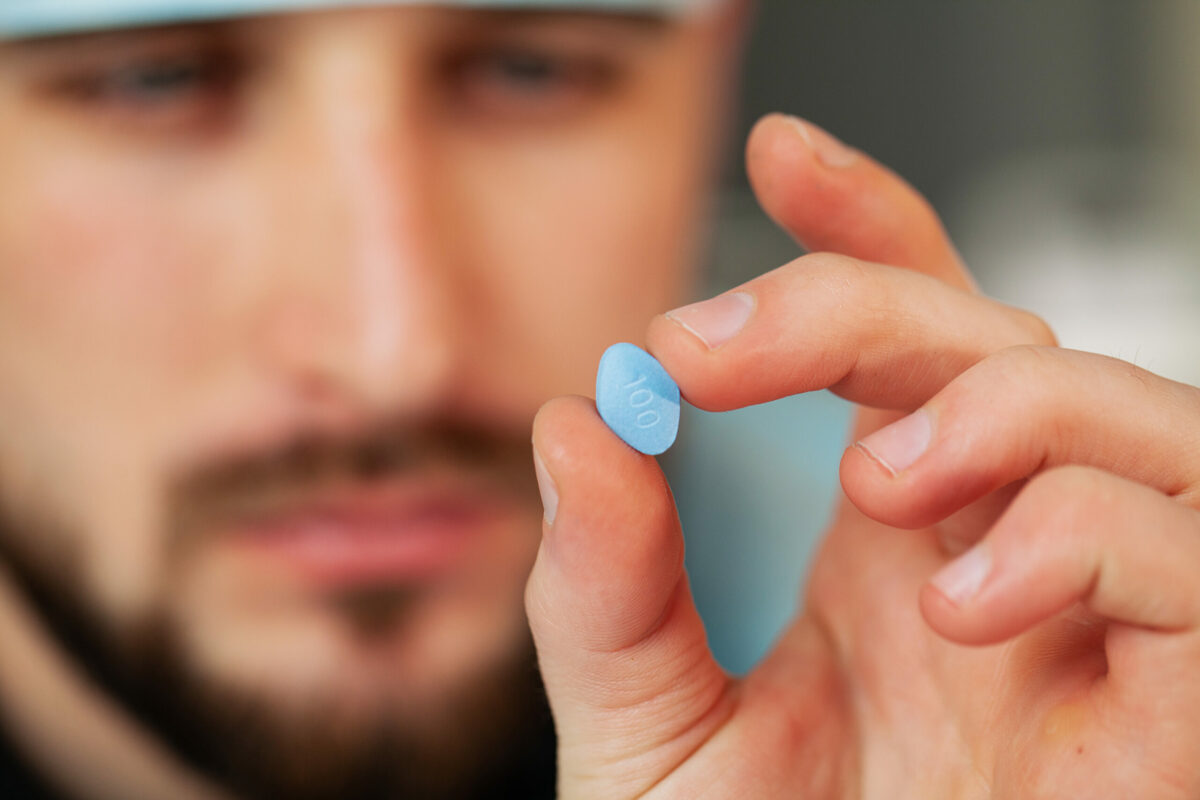A health condition in which a male cannot get and maintain an erection enough for sex is called impotence or erectile dysfunction (ED). While temporary ED is not a cause for concern, long-term erectile function problems may cause stress and negatively affect your self-confidence. Sometimes, impotence is a symptom of an underlying disease that requires treatment.
If ED causes relationship problems and stress, it is advised to see a doctor. Some people recover the ability to achieve and keep a hard erection by treating the underlying condition. However, in some cases, people need treatment that includes medicines and other procedures to treat impotence.
Symptoms
People with ED usually experience the following symptoms. Examples include:
- Persistent trouble achieving and maintaining an erection
- Decreased sexual desire
You should immediately visit a doctor to confirm the condition and get treatment if you have concerns about your impotence, experience delayed or premature ejaculation, or have diabetes or other diseases linked with ED.
Causes
Erectile function and sexual arousal in males is a complex process that involves the brain, nerves, emotions, muscles, hormones, and blood vessels. Impotence may happen due to problems with any of them. Moreover, mental health problems and stress also may cause or worsen ED.
Some people may experience erectile dysfunction due to a combination of psychological and physical factors. For example, a mild physical condition that reduces the sexual response may cause anxiety about keeping an erection. Check below some ED causes:
Physical Causes
In most cases, people experience erectile dysfunction due to a physical problem. Check below the most common causes:
- Heart disease
- Atherosclerosis (clogged blood vessels)
- Hypertension (high blood pressure)
- Diabetes
- Obesity
- Metabolic syndrome
- Parkinson’s disease
- Multiple sclerosis
- Some prescription medicines
- Tobacco use
- Peyronie’s disease
- Misuse of alcohol or illegal substances
- Sleep disturbances (insomnia)
- Reduced Testosterone levels
- Injuries or surgeries that impact the spinal cord or pelvic region
- Treatments for enlarged prostate or prostate cancer
Psychological Causes
An important role in triggering multiple physical events that cause an erection have the brain. However, there are many factors that may interact with sexual feelings and cause impotence. For example:
- Stress
- Mental health conditions (such as depression, anxiety, and others)
- Relationship problems caused by poor communication, stress, and others
Risk Factors
Generally, erectile function problems may appear in older people as a normal part of aging. In such cases, people need more direct touch to the penis to get and maintain an erection. However, some factors may increase your risk of developing erectile dysfunction. These include:
- Some health conditions (such as diabetes, heart disease, and others)
- Smoking (tobacco use restricts blood flow to the arteries and veins over time and may cause chronic health conditions leading to ED).
- Excessive body weight or obesity
- Certain treatments (such as prostate surgery or radiation therapy for cancer)
- Injuries (damage to the nerves or arteries that control erections)
- Medicines (such as antihistamines, hypertensives, pain relievers, antidepressants, or medicines used to treat prostate conditions)
- Psychological disease (such as depression, anxiety, persistent stress, and others)
- Misuse of alcoholic drinks or illegal drugs
What Are The Possible Complications of Erectile Dysfunction?
Some people may experience impotence complications, especially if they do not get treatment. Examples include:
- Relationship problems
- Low self-esteem or embarrassment
- Stress or anxiety
- Inability to get your partner pregnant
How to Prevent Erectile Dysfunction?
There are some tips below that may help prevent or reduce the risk of developing ED. For example:
- Manage existing chronic health conditions (such as diabetes, heart disease, and others)
- Perform regular checkups and screening tests with your healthcare professional
- Quit smoking or never start
- Limit or avoid alcohol
- Regularly exercise
- Reduce stress
- Do not use street drugs
Diagnosis
In most cases, a physical examination and doctor’s questions about symptoms and medical history are enough to confirm the condition. Sometimes, physicians may perform additional tests to check for underlying conditions. For example:
- Blood tests – These tests are used to check for underlying conditions (such as diabetes), Testosterone levels, and others.
- Urinalysis (urine tests) – This test is used to check for diabetes and other conditions.
- Ultrasound – This test uses sound waves to make pictures of the blood vessels that supply the penis with blood. It helps identify blood flow problems.
- Psychological examination – During this procedure, doctors will ask you some questions to determine whether you have mental health problems that cause ED.
Treatment
The treatments for ED often are different among people because it depends on the underlying condition, the severity of the ED, your age and symptoms, and other factors. Check below the treatment options usually recommended by doctors for people with ED:
Medicines
The following medicines are taken orally and are one of the best ways to treat impotence in men. These include:
- Tadalafil
- Sildenafil Citrate
- Avanafil
- Vardenafil and others
Previous medicines belong to a group of medications called phosphodiesterase type-5 (PDE-5) and work by enhancing the nitric oxide from the penis nerves. However, ED medicines are not aphrodisiacs and do not cause excitement.
However, taking any of the previous medicines does not cause an erection simultaneously, sexual stimulation also is required to release the nitric oxide from the penis nerves. Moreover, PDE-5 medicines should not be used by people who can get hard erections on their own. Potential adverse reactions of PDE-5 medicines include nasal congestion, headaches, visual changes, backache, stomach upset, and flushing.
PDE-5 medicines may not treat the condition right away. In such cases, you need to work with your doctor to find the right medicine and dosage for you. Never take ED medicines without your healthcare professional because it may lead to unpleasant results.
In addition, PDE-5 medicines are not effective in all people and may be dangerous in some situations. For instance, after prostate surgery, in people with chronic health conditions (such as diabetes), and others. Check below some cases when you should not use ED medicines:
- Nitrate drugs are used to treat angina (chest pain). For example Nitroglycerin, Isosorbide mononitrate, and Isosorbide dinitrate.
- Heart disease (such as myocardial infarction, irregular heart rhythms, heart failure, and others)
- Hypotension (low blood pressure)
Other Medicines
Check below some additional medicines used to treat impotence in men:
- Alprostadil self-injection – This medicine is injected into the side or base of the penis. In some cases, medicines used for other health problems are used for penile injections either alone or in combination. Commonly, these combinations are known as bimix or trimix. Possible side effects include mild bleeding, prolonged erection (priapism), and fibrous tissue at the injection site (rarely happens).
- Alprostadil urethral suppository – During this procedure, you will place the Alprostadil suppository inside the penis in the urethra. Usually, the erection begins within 10 minutes and may last up to 1 hour. Potential negative effects include a burning feeling in the penis, minor bleeding, and fibrous tissue formation inside the penile.
- Testosterone replacement – Sometimes, people experience ED due to extremely low Testosterone levels. Thus, Testosterone replacement therapy is often recommended by doctors.
Other Treatment Options
The following treatment options are usually used when other treatments are not effective. Examples include:
- Penile pumps – It involves a vacuum erection device (a penis pump) that is placed over the penis and then sucks out the air inside the tube. Therefore, making a vacuum that pulls blood into the penis. When the erection occurs, you should put the tension ring around the penis base and after that, you can remove the vacuum device.
- Penile implants – It involves a surgery that places devices into both penis sides. These inflatable devices help control when and how long you have an erection. However, healthcare professionals often do not recommend this treatment option until other methods have been tried first because like other surgeries it involves the risk of complications (such as infections). In addition, you cannot have a penile implant surgery if you experience urinary tract infections.
Frequently Asked Questions
What are the most common causes of erectile dysfunction?
Commonly, ED occurs due to vascular disease or blood vessel problems. For example atherosclerosis or trauma to the arteries. However, this condition may happen due to other causes too. These include hypertension, hyperlipidemia, obesity, and other conditions.
What are the complications of erectile dysfunction?
If you do not get treatment for this condition, you may experience some complications. Examples include:
- Heart disease (including coronary artery disease, stroke, heart attack, and others)
- Chronic obstructive pulmonary disease (also known as COPD)
- Fertility and relationship problems
- Emotional distress (such as low self-esteem)
This article does not contain a full list of ED complications. For more details, discuss it with your healthcare professional.
What is the most effective medicine for erectile dysfunction?
There are several effective medicines for people with impotence. These include Sildenafil Citrate, Tadalafil, Avanafil, and Vardenafil. However, if these medicines are not effective, physicians may recommend other treatment options.
If you have additional questions, ask your healthcare provider.




